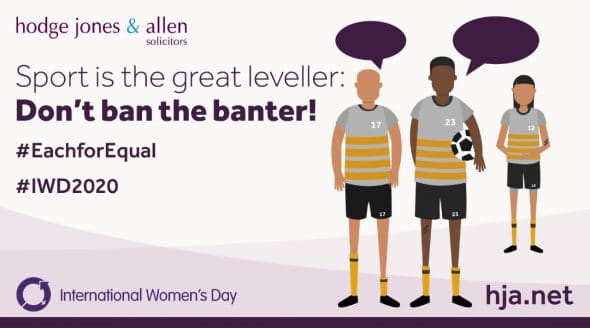#IWD2020 – Sport is the great leveller: don’t ban the banter!

On a Monday morning, my colleague and I (both women, both season ticket holders) will often discuss the trials and tribulations of our respective football teams over the weekend. Sport is famously the great leveller – it is a mutual interest for many people, regardless of age, background, gender – and it often forms the basis of office chat.
Ann Francke, the CEO of the Chartered Management Executive, recently hit the headlines, for her comments that employers should be vigilant about sports chat in the workplace. In her opinion, it not only causes women to feel ‘left out’, but can also lead to laddish behaviour and ‘banter’ such as men ‘slapping each other on the back and talking about their conquests at the weekend’.
Ms Francke’s sweeping generalisation that women do not and cannot talk about sports such as football and cricket perpetuates harmful stereotypes about women’s participation in the world of sport. She also fails to address the point that sports chat can exclude (and frankly be quite dull) to anyone who is not interested in sport, male or female. There are always those who will groan when the topic is brought up – but the same could be said of any other subject. In our office there was a much discussed sweepstake regarding the final episode of Game of Thrones (a show I’ve personally never seen), whereas others may prefer to discuss food, travel, the weather. In any workplace, any one individual will have interests in common with some colleagues and not others.
Despite the obvious shortcomings in Ms Francke’s argument, her point regarding sports chat giving way to ‘banter’ leads us to the ever-present question in employment law – when is the line crossed from ‘banter’ to harassment? In recent years, there has been a rise of the ‘banter’ excuse in Employment Tribunal cases i.e. perpetrators defending themselves by saying their comments/behaviour were meant in jest and not intended to cause offence. Understanding the legal definition of harassment is therefore key for employers, to help them guard against conversations/behaviour which may stray towards harassment and discrimination.
Harassment is defined in the Equality Act 2010 as:
- Unwanted conduct
- Related to a relevant protected characteristic (e.g. race, gender, disability)
- Which
- Violates a person’s dignity; or
- Makes them feel intimidated, degraded or humiliated; or
- Creates a hostile/offensive environment for them.
Whether the second part of the definition is satisfied depends on:
- How the person perceives the conduct
- Other circumstances of the case
- Whether it is reasonable for the conduct to have had that effect on the person.
It is the way that the conduct makes the person feel that is important, not whether the perpetrator intended to harass them.
Claims for harassment can be brought against both the individual perpetrator and the employer. It is feasible, therefore, that conversations about sport could indeed lead to comments which may be deemed sex harassment; but, arguably, any water-cooler conversation could end up landing an employer in hot water!
What can employers do to prevent harassment?
The idea of an employer policing employee conversations about sport would likely be met with incredulity by many. There are, however, a few simple steps employers can take to ensure that they are creating an inclusive environment and helping to avoid discrimination and harassment.
Employers should ensure:
- Staff are aware of the standards of behaviour expected of them – this should be set out in a clearly worded policy which also identifies examples of harassment – harassment is not always easy to stop
- Staff are provided with training regarding bullying, harassment and discrimination and acceptable standards of behaviour, including how to deal with situations when they arise;
- Employee complaints are investigated fairly, consistently and without delay;
- Appropriate disciplinary action is taken as and when necessary.
As an employer, you should therefore be mindful of what your employees are saying insofar as their comments may lead to harassment and discrimination but that’s as far as it should go. Sport is the great leveller – don’t ban the banter!
The author is this blog is Ellen Clabburn, former employment law paralegal.


